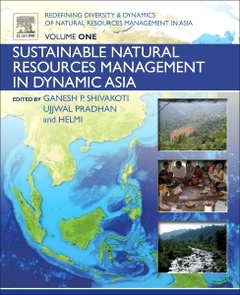Redefining Diversity and Dynamics of Natural Resources Management in Asia, Volume 1 Sustainable Natural Resources Management in Dynamic Asia
Coordonnateurs : Shivakoti Ganesh, Pradhan Ujjwal, Helmi Helmi

Redefining Diversity and Dynamics of Natural Resources Management in Asia, Volumes 1-4 brings together scientific research and policy issues across various topographical area in Asia to provide a comprehensive overview of the issues facing the region.
Sustainable Natural Resources Management in Dynamic Southeast Asia, Volume 1, pulls together regional experts in the field to look specifically at sustainability issues across the region, to see what has been implemented, what the impacts have been, and what other options are available. In the race to be a developed region, many Southeast Asian countries have foregone natural resources through haphazard use. As a result, the people are faced with numerous environmental challenges, particularly deforestation and forest degradation, biodiversity loss and ecosystem degradation, reduction in soil quality, and decreases in the quantity of available water.
Community-based forest management is the involvement of local communities in the protection, conservation and management of public forests to prevent degradation through sustainable practices while still responding to the basic social and economic needs of local populations. When the people who depend on forest resources for their livelihoods are jointly responsible for managing and protecting them, they tend to do so in a more sustainable manner by focusing on the long-term benefits rather than the immediate short-term gains. However, when tenure rights are weak, unclear, or insecure, or offer limited benefits, people are incited in extracting more immediate benefits, resulting in suboptimal forest management and the reduction of carbon stocks.
Section I: Introduction and Conceptual Background 1: Challenges of Sustainable Natural Resources Management in Dynamic Asia 2: Theoretical Advances in Community-Based Natural Resources Management: Ostrom and Beyond 3: Governing the Commons Through Understanding of Institutional Diversity: An Agenda for Application of Ostrom’s Framework in Managing Natural Resources in Asia
Section II: Theoretical Issues 4: Challenges of Polycentric Water Governance in Southeast Asia: Awkward Facts, Missing Mechanisms, and Working with Institutional Diversity 5: Modeling Effect of Conservation and Livelihood Policies on Community Land Use and Management in Yogyakarta 6: Social Insecurity, Natural Resources, and Legal Complexity
Section III: Learning From The Field Cases/Issues 7: High Resolution of Three-Dimensional Dataset for Aboveground Biomass Estimation in Tropical Rainforests 8: Integrating Social Entrepreneurship in the Design Principles of Long-Enduring Irrigation Management Institutions: A Lesson From the Karya Mandiri Irrigation System in West Sumatra, Indonesia 9: Land Rights and Land Reform Issues for Effective Natural Resources Management in Indonesia 10: Dynamics and Effectiveness of the Multistakeholder Forum in Promoting Sustainable Forest Fire Management Practices in South Sumatra, Indonesia 11: Collaborative Governance of Forest Resources in Indonesia: Giving Over Managerial Authority to Decision Makers on the Sites 12: Coastal Water Pollution and Its Potential Mitigation by Vegetated Wetlands: An Overview of Issues in Southeast Asia 13: Scaling the Costs of Natural Ecosystem Degradation and Biodiversity Losses in Aceh Province, Sumatra 14: Targeting Deforestation Through Local Forest Governance in Indonesia and Vietnam
Section IV: Looking Forward 15: Prospect of Sustainable Peatland Agriculture for Supporting Food Security and Mitigating Green House Gas Emission in Central Kalimantan, Indonesia 16: Decentralization of Forest Management, Local Institutional Capacity, and Its Effect on Access of Local People to Forest Resources: The Case of West Sumatra, Indonesia 17: Can Uplanders and Lowlanders Share Land and Water Services? (A Case Study in Central Java Indonesia) 18: The Role of Information Provision on Public GAP Standard Adoption: The Case of Rice Farmers in the Central Plains of Thailand 19: A Multiple Case Study on Analyzing Policy and Their Practice Linkages: Implications to REDD+
Section V: Concluding Section 20: Managing Dynamic Natural Resources in 21st Century in Asia
Ujjwal Pradhan has been the Regional Coordinator for Southeast Asia for World Agroforestry Centre. He is responsible for leading scientific teams, mobilizing resources and building partnerships, as well as managerial oversight and reporting for the Centre’s operations in Indonesia, The Philippines, Thailand, Vietnam and China. Ujjwal previously worked for the Ford Foundation as a Program Officer; in the field of environment and development in Indonesia, and in water resources development and policy as well as environmental justice in India.
Professor Helmi is Professor at Andalas University, Padang, West Sumatra, Indonesia. Since before receiving his PhD in Agrarian Development and Public Policy from the Department of Agriculture Economics at Wye College, University of London, Dr Helmi’s work has focused on the intersection of local needs, development and natural resources, including a tenor at Vice Director for the Center for Irrigation, Land and Water resources and Development Studies. He actively promotes development and management of na
- Features case studies that cover issues such as rising levels of deforestation, forest degradation, regional food security, ecosystem degradation, biodiversity loss, conflicts over natural resource use, water management issues, and impacts on local communities
- Includes contributions from local researchers who are dealing with these issues first hand, and on a daily basis
- Includes a comparative review on REDD+ implementation in different communities
- Focuses on sustainability issues across the region
Date de parution : 09-2016
Ouvrage de 416 p.
19x23.3 cm



